Course lectures "Startup". Peter Thiel. Stanford 2012. Session 18
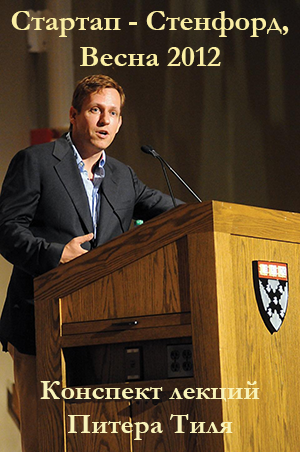
In the spring of 2012, Peter Thiel ( Peter Thiel ), one of the founders of PayPal and the first investor of Facebook, held a course in Stanford - “Startup”. Before starting, Thiel stated: "If I do my job correctly, this will be the last subject you will have to study."
One of the students of the lecture recorded and laid out a transcript . In this habratopic ardin , translates the eighteenth lesson, the editor astropilot .
Session 1: Future Challenge
Activity 2: Again, like in 1999?
Session 3: Value Systems
Lesson 4: The Last Turn Advantage
Session 5: Mafia Mechanics
Activity 6: Thiel's Law
Activity 7: Follow the Money
Session 8: Idea Presentation (Pitch)
Lesson 9: Everything is ready, but will they come?
Lesson 10: After Web 2.0
Session 11: Secrets
Session 12: War and Peace
Lesson 13: You are not a lottery ticket
Session 14: Ecology as a Worldview
Session 15: Back to the Future
Session 16: Understanding
Session 17: Deep Thoughts
Session 18: Founder — Sacrifice or God
Session 19: Stagnation or Singularity?
Lesson 18 - Founder - Sacrifice or God
1. traits of the founder
The founders are important. People understand this. Founders are often discussed. Many companies in general look like the cults of the founders. Let's talk a little about the anthropology and psychology of the founders. Who are they, why do they do what they do?
')
A. Start PayPal

The founding team of PayPal consisted of six people. Four of them were born outside the United States. Five of them were 23 years old or less. Four of them collected explosive devices while studying at the university (your humble servant was not among them). Two of them did it in the communist countries: Max in the Soviet Union, Yu Pun in China. They did not do what people used to do in these countries at that time.
This eccentricity does not end there. Russ grew up in a trailer park and was able to go to school in Illinois, specializing in math and science. Luke and Max started insane enterprises at the University of Illinois at Urbana-Champaign (Urbana-Champaign). Max, perhaps a little overly, liked to talk about his insane abilities (he claimed earlier and now claims that he has 3 kidneys). He came to the United States under the guise of a refugee a few weeks after the collapse of the Soviet Union, but before new countries were formed. Therefore, he liked to say that he is a citizen of a non-existent country. What created incredible difficulties for travel. Everyone decided that he should not leave the country until he was sure that he could return to it.
Ken was more rational. However, again, he agreed to a 66% pay cut in order to participate in PayPal, instead of going to work in the field of banking investments after graduation from Stanford. So here.
One could go on and on. The main question is whether there is a connection, and if so, which one, between the founders and their extreme features.
B. Distribution
Many traits have a normal distribution in the population. Suppose that all features are combined on a normal distribution graph. On the left, we will have negative perceptions, such as weakness, intractability, and poverty. On the right, we will have traditionally positive traits, such as strength, charisma and well-being.

Where are the founders? Of course, they are slightly less average and a little more extreme than ordinary people. Then, maybe, the distribution of the founders is shifted to the edges:

But these are very undervalued things. We can go further. Perhaps the distribution of the founders, however strange it may seem, is the opposite of the normal distribution. Both edges are strongly raised. Perhaps the founders are complex combinations, for example, from strong insiders and strong outsiders at the same time. Our ideology seeks to isolate and strengthen only one side. But maybe these principles are not suitable for the founders. Perhaps the truth about the founders includes both approaches.

C. Is a distribution possibly opposite to normal?
There are 4 simple explanations for the strange, inverted distribution. The first two reflect the usual opposition “nature versus upbringing”:
1. It is from nature. The founders are really different. Max Levchin really has 3 kidneys.
2. It has been developed or brought up. Cultural interaction makes founders different.
However, the “nature versus upbringing” paradigm suggests that the distribution is correct. In fact, it can be a myth. For the case if it is fictional, there are two explanations:
3. It is exaggerated by the founders themselves.
4. It is exaggerated by someone else.
Reflections on the founders makes one wonder which explanations are appropriate and which are not. The difficult answer is that all four are correct to some extent. To separate them is very difficult. In fact, they feed off each other in important but complex ways.
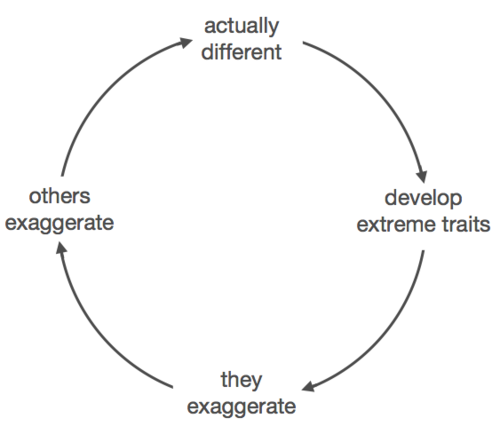
In dynamics, it may look like this. People start to be different. They are raised in such a way as to develop some kind of extreme features. These traits are becoming increasingly important, and they have to learn to exaggerate these traits. Ambient perceive it as bloated importance and exaggerate in turn. Thus, the founders are even more different from the rest than before. And so on and on.
In fact, the arrows can be directed in the opposite direction. Or interactions may not line up in a simple circle, but form more complex feedbacks. The bottom line is that the process is not influenced by static parts, but by combinations of interactions.
D. Application value
Oddly enough, we can apply this scheme to any particular founder.
Take, for example, Sir Richard Branson. The main question is whether Branson should be king.
He was called:
- King of advertising
- Virgin King
- King of the Desert (and Cosmos)
- King of branding
- Ice King
- and even King Muppets

Let's start with the hairstyle. He looks like a lion. By the way, in the picture above, he is actually dressed like a lion. Looks a bit over the top. In any case, there is a suspicion that he was born with such a hairstyle. It was probably because of this that he cultivated and cultivated his manners over time. To establish the truth is difficult. It is very difficult to really know the exact dynamics, because the stories about heroic founders are told in an exaggerated and modified form.

Jack Dorsey is another suitable example. It most falls on the extremes of the graph and least of all on its average values. From the very beginning, he wore a nose ring and disheveled hair. He had a tattoo. Then he moved to the other end of the reverse distribution. Now he wears Prada suits and trendy shirts. His image has changed from an extreme outsider to an extreme insider. And all this is connected with the superficiality of judgments about appearance.

Sean Parker can be considered a textbook example of an extreme founder. He had a rise, fall, rise, fall, and again rise. His experience in the launch of various things implicated on extreme. He did not go to college. He may not have graduated from university. He entered into various underground hacker circles in the 90s. He made Napster a teenager. It was a crazy rise and fall. Crime is, of course, the extreme category of outsiders. There were all sorts of questions about whether Napster was really an illegal enterprise.
For DCMA (Digital Millennium Copyright Act), each company must indicate a support telephone number. In Napster, it was Sean's mobile number. He spent a lot of time in the early 2000s, convincing mothers in the middle west that their children would not go to jail for downloading Metallica's album.

And then there were ridiculous drug-related charges, and the story of crazy stars. Sean got on the cover of Forbes 400, he found a way to stand out even among the richest people in the world. Justin Timberlake played Shawn in a Facebook movie (“Social Network”, approx. Lane). There is one person in Clarium who looks a lot like them. When he leaves Silicon Valley, people take him for Justin Timberlake. But in Silicon Valley, people take him for Sean Parker.
Sean looks as attractive to people as he is dangerous. One random story, including the surfing trip of the Founders Fund in Nicaragua for the new year in 2007. We flew in a private jet to Managua. Probably, we were the only people with a private jet in this country. We drove to a remote city on the coast. It all started great. We threw an amazing New Year's party. Except that she was becoming more and more crazy. Our professional guards were forced to expose several people when dragdillers and other dubious types began to appear. According to Sean, from that moment strange things began. 36 hours later, on the morning of January 2nd, Sean was almost convinced that the guard was plotting against him, and they were going to kidnap him. He very quickly passed from the state of "his" to the state of "outsider". Together with his girlfriend, they threw luggage and fled by taxi to Managua International Airport. The rest thought it was a paranoid exaggeration, so they stayed as planned. Of course, the guard was upset when he noticed that Sean had gone from there. We told him that Sean was going to leave tomorrow so that he could leave before they tried to arrest him at the airport. In the end, everything ended well, and no one was kidnapped. But, probably, there will be no more Founders Fund trips to Nicaragua.
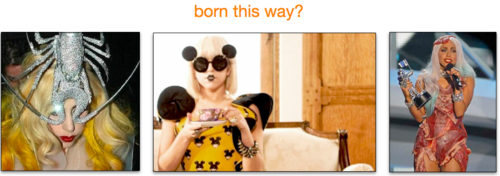
This allows you to go on to the version of the pure celebrity, best embodied Lady Gaga. Born This Way is her last successful album and song. On the one hand, all this is an obvious fiction. Perhaps you can say that in fact she was not born that way. To a greater extent it should be education. On the other hand, maybe it is from birth. What kind of people will do this with them? Maybe someone was actually born to behave this way. Who can know for sure? Is Gaga created by her own myth? Or a myth created by other people? Or both together?
Ii. Mythology
Oddly enough, classical mythology has something in common with an inverted distribution curve. There are monsters, and there are gods. And very often they are the same.
In what sense are the founders like mythical heroes? Establishment myths are very common. Are there any differences in the mythical heroes? Do they have extreme traits? Do they develop these traits? Do they exaggerate themselves? Do others embellish their stories?
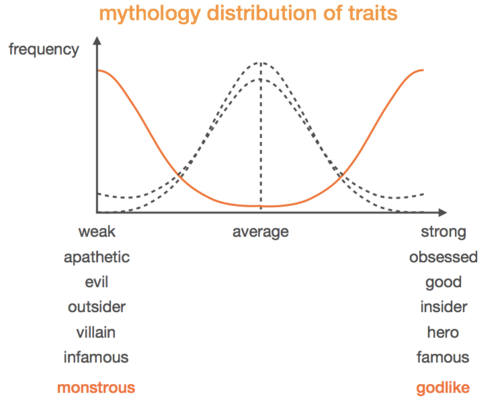
Consider Oedipus. He was both "his" and "stranger." He was a king. He was so brilliant that he managed to solve the mystery of the Sphinx. But he was left to die on the hill like a baby. He was a stranger who came from another locality. And then there were accusations of incest and the subsequent fall.
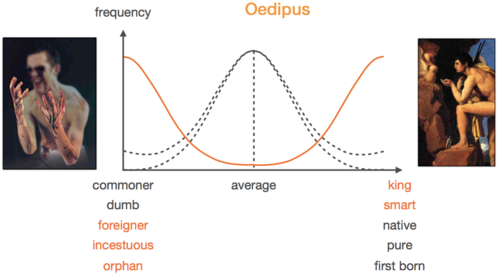
Achilles is another mythical hero who was noted in the extremes. He was incredibly strong and perfect, except when he was weak.
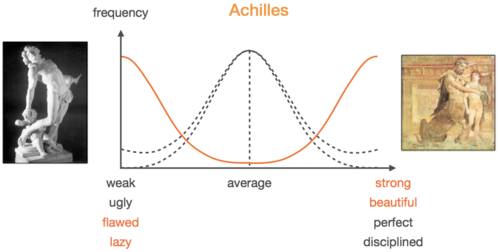
Perhaps the most classic startup of all is the foundation of Rome. Romulus and Ram were beggars, ordinary orphans raised by wolves. They were "strangers." But then they became founders and lawmakers. Romulus killed his brother and became a criminal and a king. If hierarchy is possible for this, then if you kill a brother, it is worse than to kill some random person, and to kill a twin brother is even worse. It turns out that Romulus was an unusually bad criminal. Legend has it that Ram was killed for stepping over the imaginary border of Rome that Romulus had spent. This rule was written in blood: anyone who jumps over the walls of Rome will be destroyed. Does this mean that Romulus has become a criminal? Or did it make him the king who founded Rome? Depends on much. Maybe both.
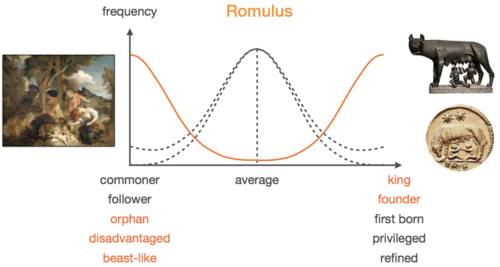
Ram is obviously a bad graduate. The end of Romulus was more ambiguous. According to the story of Libya, there was a terrible storm that frightened people. When the storm calmed down, Romulus disappeared. It was announced that he had become a god. But Livy also mentioned an alternative - a group of senators-conspirators caught Romulus and took advantage of the chaos of the storm to cover up his murder and get rid of the body.
Another mythical element was a flock of 12 eagles, which Romulus saw from the Palatine Hill. They symbolized 12 centuries, during which Rome would exist, after which the bloody debt for the basis of Rome mixed in on the crime should be paid .. Approximately 12 centuries later, Attila’s Hun apparently thought it would be a good idea to copy Romulus, and kill his Bled brother . By the way, fratricide is probably no longer considered an effective approach to founding companies.
Iii. Archaic cultures
A. Sacrificial Cycle
The dynamics of the founder / extremity / infamous or something very similar was an incredibly important part of ancient cultures. The main problem of these cultures was the presence of various conflicts everywhere. People did not know what to do. There were no rules - a striking parallel with the context of technology startups. In the midst of this chaos there was a war of all against all.
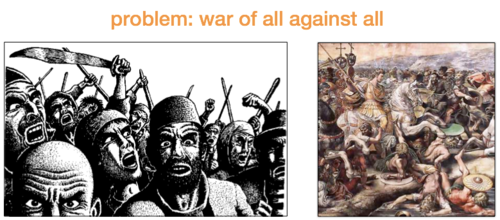
Various theorists of the Enlightenment insisted on breaking out of this natural state, so that people would unite, speak well and draw up a social contract. But nothing like this happened. Where the warring civilizations were not destroyed, most often the resolution of the conflict included the polarization of society and the direction of all hostility towards one particular person. Depending on the culture, the witches burned or cut out their hearts. The differences were not significant. But the dynamic — a mad society, cohesive around the sacrificial scapegoat — was the same.

In cultures that have some degree of constancy, this becomes a critical process. In the absence of strong institutions, the world has never been long. Something went wrong. It could be a disease lesion. Or there appeared some internal (less often external) conflict, which led to complete chaos. And then people gathered, united against the scapegoat, and performed the sacrifice. Peace has been restored. And the cycle was repeated to infinity.
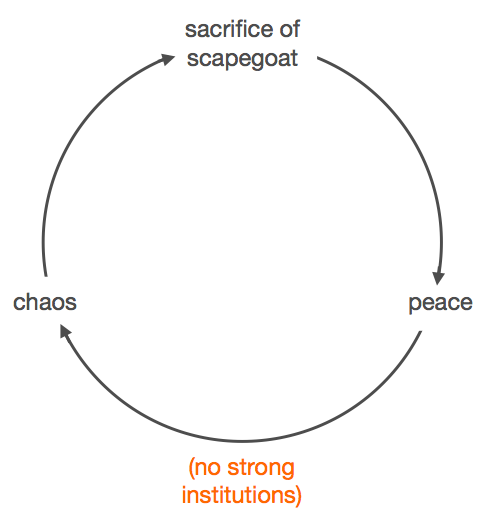
Obviously, scapegoats are very strong. Scapegoats can turn conflict into peace. This makes the scapegoat an absolute evil: if peace comes after killing him, then he must be very bad indeed. In the same way, he can be the absolute of good: with the price of his life, he ensures a peaceful life for others. Probably the correct answer is both.
It can be assumed that in many cultures this process has become ritual. People have realized the power of the scapegoat and are extracting it from localized contexts. Instead of waiting for the random uncontrollable chaos, the victim became planned. Of course, there were likely cultures that never understood this. They could not systematize the scapegoat. So everyone just killed everyone, and the culture collapsed. It can be assumed that the cultures that managed to ritualize and repeat the cycle were those that existed for some time.

B. Victim Search
There are all sorts of questions about how to search for a scapegoat. Sometimes processes are random. In Gaelic Scotland, people bake a cake on the fire of the Bonfire Festival and cut it into pieces. One piece is marked with coal. Men choose a piece from the hood (men's Scottish hat). The one who received the black piece was doomed, and it was sacrificed to Baal. Residual forms of this persisted until the 18th century, where the doomed had to simply jump over the fire and not die in it.
The ancient Gauls introduced a more objective approach. Someone must be sacrificed on the eve of the battle in order to win the favor of the gods. But who will it be? Instead of complicating, the Gauls simply ran to the battlefield. Naturally, the slowest person was the one who was sacrificed.

C. Anatomy of the Goat Allowance
The ideal scapegoat is one of both extremes. He must be at the same time extremely alien and extreme. This can not be completely random person, taken from a homogeneous set. It must be a stranger in some way, so that people in the crowd would not imagine themselves in his place and not realize that the sacrifice was essentially the same as they (and the next time they may be in his place). But the scapegoat can never be completely different from the crowd. He must be his own, because the reason for the ritual is that he is responsible for the internal struggle of the community.
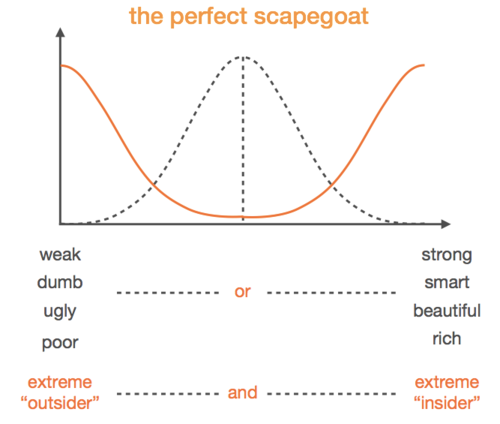
D. The Origins of the Monarchy
Not all scapegoats are always hated. Very often they are worshiped before they are sacrificed. People will give a scapegoat some amount of power before being torn to pieces. These scapegoats are either worshiped or demonized after they have been omnipotent.
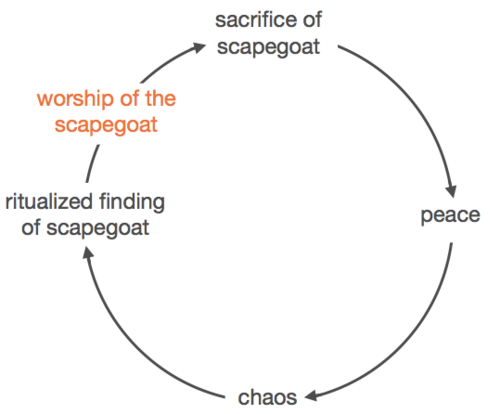
One working theory states that a monarchy arose in this way. The Aztecs, for example, simply enthroned some quasi-God-king for a while, after which he was sacrificed. The kings became the scapegoats who had not yet been killed. Every king was a living god. Every god was killed by a king.

Perhaps the Egyptian pharaohs started off as scapegoats. Perhaps the first pyramids were piles of stones that served as a tomb for people who were stoned to death. Later, when the pharaohs became powerful kings and it was unthinkable to kill them, while they were alive, the people continued to lay all the big piles of stones on them after their death.

Given this dynamic, we can imagine how the monarchy came into being. The scapegoat just figured out how to maintain its power and indefinitely delay its execution.
The Zulus kingdom was a militant African monarchy in the 19th century. The Zulus king was supposed to be strong and powerful. He could have hundreds of wives and do almost anything. But as soon as his hair began to turn gray and wrinkles appear, his power disappeared. He was considered unfit for the king, overthrown and killed. Not surprisingly, on first contact with the English, the Zulu kings were most interested in hair coloring lotion than anything else. The question that is also worth asking is whether there is a similar phenomenon in our present society.
E. Sacrifice Policy
According to Aristotle, the tragedy functioned in such a way as to reduce the common anger of the people towards successful people. The lesson in all tragedy is that even the greatest people have tragic flaws. All are defeated.Thus, for ordinary people, it was a catharsis to see how terrible things happen to extraordinary people, even if only on stage. Tragedies were political tools that turn envy and anger into pity. Ordinary people came back content to their home after the performance, instead of plotting against the upper class.

Julius Caesar was a classic example of a stranger among his own. In time, of course, he was killed. Each subsequent Roman emperor was to be largely Caesar. And the sacrificial cycle was repeated endlessly for many centuries after that.
Being extremely yours is great until everything goes wrong. Marie Antoinette was such a friend of hers. But people went to her. She was Austrian, that is, a foreigner. She was faced with accusations strikingly similar to those from the Oedipus myth. It is not very clear whether the story of "Let them eat cake" was real or not. But all the great revolutions can be described as a quick transition from one's own to another. During the French Revolution there was an interesting legal discussion about whether to judge the king. Robespierre and the revolutionaries strongly opposed the trial. They believed that the king should be killed like a wild beast. Having a court would mean that the king could be innocent, which in turn means that people could be guilty. But it was unthinkable that people could be guilty. So the decision was just to kill the king.
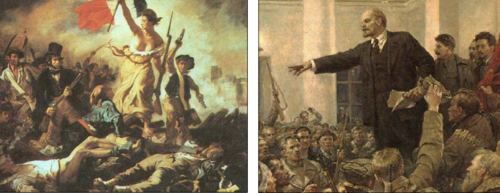
Iv. Sacrifice lives for centuries
A. In culture
The current version of this is 12 jurors in a criminal context. The unfortunate 13th is a criminal who is punished or killed. This is the classic scapegoat mechanism. It is assumed that the 13th (and, perhaps, it is) is different from the rest. The jury jury truly never equals you. If you are a murderer, then 12 murderers are not judging you. If you are rich, then they are not looking for 12 rich people to decide your fate. And it is not at all clear whether the jury works for the stated purposes. It seems to work in conditions where people perceive things as they are. But in other conditions it is just a crazy sacrifice.

Another modern version has to do with celebrities and resurrects the monarchist dynamic, which has long been dead, as people thought. We literally anointed our stars to the kingdom. Elvis was the King of Rock, Michael Jackson was the pop king. Britney Spears was a pop princess. I think Madonna was the queen. Our titles run out pretty quickly.

Then, at some point, something goes wrong. The anointed are placed on a pedestal only to overthrow them. Elvis self-destructed in the 70s. Michael Jackson visibly decayed. The figure below shows Britney Spears at the peak of paparazzi madness. A few years ago, the paparazzi industry was $ 400 million a year. Britney Spears accounted for $ 100 million of them. Between 1,000 and 2,000 people lived by chasing and photographing her. Something went wrong?Was Britney really crazy? Was she crazy after she was isolated as a superstar since childhood? Maybe the crowd got to her. Or perhaps she intentionally acted in such a strange way to advertise.

Despite this, such stars live in a very strange afterlife. In life, they are overthrown from pedestals. But after they die, they are resurrected as god-kings. The circle closes.
Another example of this is Club 27, whose members are Janis Joplin, Jimmy Hendrix, Jim Morrison, Kurt Cobain, Amy Winehouse, etc. This is a set of famous musicians who died at the age of 27 years. “They tried to get me to go to a rehabilitation center, I said,“ No, no, no. ” There are all sorts of questions that could be asked. But there is a sense in which these people will continue to live as cult cultural figures.

The dynamic “from destruction to perpetuation” goes back to mythology. Alexander the Great was 32 years old when he died. He often participated in cruel pseudo-religious alcoholic marathons. Apparently, the game was to drink until someone died. Alexander felt that he had to prove that no one could be him. It was a strategic mistake. But he will always be known as a great conqueror.
B. In politics
The political version is associated with certain ideological distortions. People left and right tend to be focused and even obsessed with people from the other side. Every opponent becomes a crazy and legitimate scapegoat. In reality, the truth is that it usually includes a strange combination of both.
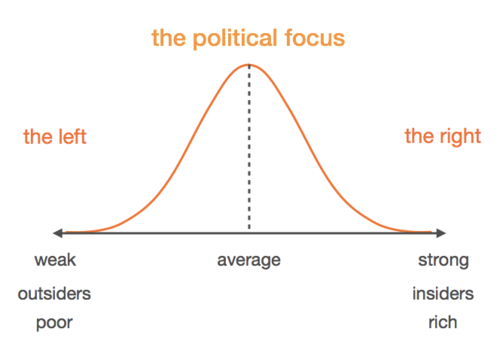
Two of our greatest presidents had this kind of strange heroic arc in their history. Abraham Lincoln was extremely stranger, who became his. He was born in a wooden hut. He may have been the poorest president. He was very clever and also very ugly. And he, perhaps intentionally, disfigured himself even more with his strange beard. Lincoln was always on two extremes. The end of his life is strangely connected with the story of Caesar. John Wilkes Booth, believing that he reproduces the murder of Caesar, shouted "Sic semper tyrannis" ("This is the fate of tyrants") when he shot Lincoln - this, of course, is what Brutus said, when he killed Caesar.

A strange counterpoint to this comes from Lincoln's very first public speech. The future president pronounced, as it is now called, the Lyceum Speechfor a small crowd in Springfield, Illinois in 1837, when he was 28 years old. It is worth reading it completely.
It starts like this:
The theme for the comments on this evening was “Perpetuation of our political institutions”.
Lincoln said that there can be no more fundamental moments in the United States.
The foundation occurred in the 18th century. It is over. At the moment, all that could be done is the preservation and maintenance of things. There is nothing truly new that anyone could hope to do in our government.
Around the middle of a speech, everything becomes really interesting. Lincoln asks if ambitious people will ever try to be founders, or whether they will be fully satisfied with existing institutions. He answered “yes” and “no” respectively:
, , ? , . , , , , . . , , ? Never! , . . , . , , - . , , . , . , , . , , , , ?
The point is that we have to be really careful, because such people can exist.
Kennedy's story was different, but the main dynamic was the same. He was one of the richest people who became president, with a fortune of about $ 1 billion in terms of today's money. His father was a smuggler. He was on amphetamine most of the time. He ceased to be his rich when he found himself a stranger. It didn’t matter if it was intrigue or plot, but it led to his murder.
C. In technology companies.
This dynamic is repeated again and again, in the context of the founder of the technology company. Let's focus on 3 cases: Bill Gates, Howard Hughes and Steve Jobs.
Who is most important in the world right now: Bill Clinton or Bill Gates? I dont know.- Peter Jennings
Those who are old enough to remember will remember Bill Gates as God from the 90s. The president of the United States always has almost divine status. Therefore, when you are compared with the current president, it is quite extreme.
All the same questions apply to Gates. Was it nature or nurture? He was his at Harvard, but, leaving school, became a stranger. He wore big glasses. Has he become a clever man besides his will? Or does he thrive because he emphasizes his dissimilarity to ordinary people? Hard to say.
Bill gates like god
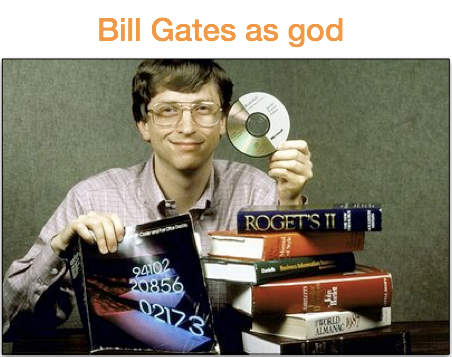
It is quite clear, however, that good times do not last forever:- Dennis Miller
Bill Gates is a monocle and a Persian cat, not a villain from the James Bond movie.
One (admittedly unconventional) theory is that Bill Gates still suffers and suffers from his defeat. He is forced to go on all sorts of boring charity events, pretending that people say interesting things there, and then also give them their money. And, to further thicken the paint, it should be noted that these are the same people who turned against him in the late 90s.
Bill Gates as a victim

Howard Hughes was one of the greatest founders in the 20th century. His life was a very extraordinary way to this from 1930 to 1945. He began quite successfully. He continued, having achieved incredible success in film and aviation in parallel. In retrospect, these were two growing high-tech industries in the 1930s. He became the richest man in the United States at 45. If Hughes had not died in a plane crash that he got in 1946, he would have gone as the greatest entrepreneur of the 20th century.

One of Hughes' favorite tricks was pretending to be crazy, based on the theory that no one would waste time and energy to try to stop or compete with a crazy person. Most of his mythology was fictitious. He claimed, for example, that he was born on December 25, 1905. One must wonder whether he was actually born on the same day as Christ, or whether it was a deliberate move.
“Howard Hughes was a speed obsessed dreamer who flew like a god ...”- Martin Scorsese
Hughes’s departure from grace began after the accident in 1946, when he became addicted to painkillers. He was more or less hiding in penthouses for 30 years, connected to intravenous therapy devices and refusing to eat. Looking back, we can say that this is a rather grim story. The madness continued even after Hughes died; since there was no will, distant relatives and doubtful personalities began a long and vicious struggle for his property.

And here is the version of Steve Jobs. Perhaps you could tell a few different versions of the Jobs version. Let's concentrate on the version from the 70s and 80s. He had all the classic features of his extreme and extremely alien. He flew out of college. He was eccentric, and there were all these crazy diets. He started by hacking the phone along with Steve Wozniak. He was taking LSD.

Ultimately, he was expelled from Apple, and was replaced by John Scully, who looked much more normal, an adult, who should be responsible.
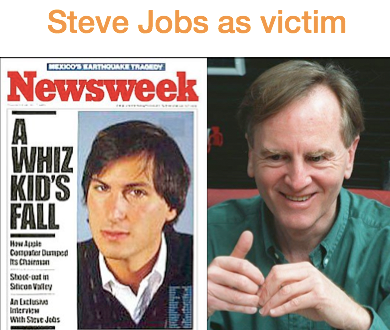
Let's go back to some archaic cultures. Isn't it true, the dynamics are about the same as before? We are accustomed to think of a monarchy as a dead and non-existent institution. Is this really true? Time Magazine placed on the cover of Marc Andreessen in February 1996, sitting in a chair that looked like a throne! Later he was a little harassed when things went bad in Netscape. Now he seems to have fully recovered.

Mary Miker had the same rise and fall, and then rise again. Called "The Queen of the Network," Miker was an influential market analyst, perhaps the most optimistic person on the network in the 90s. If she wrote about your company, your shares went up. She received a lot more negativity from the public when the 90s technology bubble burst. She was overthrown from the pedestal. But because of this, she came to Morgan Stanley and again became very successful, now as a venture capitalist.
D. Can this be avoided?
How much of this can be avoided? How can you avoid sacrifice? The simple answer, of course, is that if you do not want to be killed, you do not need to sit on a throne. But this is not enough. Wearing a crown is very cool. The question is, can you avoid this penalty. This is the danger of being extremely extreme. Push too hard and the poles will roll over; you end up extremely alien, and everything will fly into the pipe. There were 44 American presidents. Four of them - 9% of the presidents - were killed in the line of duty. Four more were nearly killed. Your chances of not dying a violent death are strikingly lower if you are not the president. At the very least, this is worth considering if your goal is to be president.
This does not mean that people can or should flee, renouncing the throne. Sometimes it's better to take a chance. And maybe you can reduce the risk. There must be leaders and founders. These people are expected to wear the crown. This necessarily includes playing with fire. The trick is that when mistakes are made, they are difficult to detect immediately. They are much easier to analyze in retrospect. Bill Gates was incredible in the 90s, until Larry Ellison and Scott McNeely and a bunch of executives from other technology companies launched an effective campaign “We Hate Gates,” which attracted the attention of the Department of Justice and other institutions. From the point of view of Gates, he was on an eternal winning arc of endless progress. Everything was fine, and the haters were just envious and pathetic. But as soon as something changes, the changes occur fairly quickly. The fall is so painful that it is difficult to fully recover.
V. Extension of the base
A. Forms and Theory
One of the strategies, how not to become a scapegoat, is to extend the moment of foundation. With the big reservation that there may not be a silver bullet - the dynamics of a founder who has become a god and then a victim may be inevitable to some extent. Therefore, let's develop some ideas how to overcome this dangerous path.
You can mark different forms of government on a one-dimensional axis:

The startup, basically, is arranged as a monarchy. We, of course, do not call him that. It seems wildly outdated, and everything that is not a democracy gives people discomfort. But let's take a look at the orgschema:
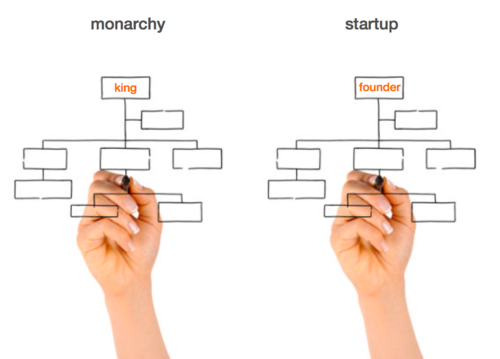
This is definitely not a representative government. People do not vote. When a startup becomes a mature company, it may be more inclined to a constitutional republic. There is a council that theoretically votes on behalf of all shareholders. But in practice, even in this case, it ends somewhere between the constitutional republic and the monarchy. Already at an early stage it is a pure monarchy. It is important that it is not an absolute dictatorship. Neither the founder nor the director has absolute power. It is more like archaic feudal structures. People endow the first person with all kinds of strength and abilities, and then blame them if things go wrong.
We are biased towards the democratic / republican part of the spectrum. This is what we are used to in civil law lessons. But the truth is that both startups and founders lean towards the dictatorial side, because this structure works better for startups. Here the tyrant is more important than the crowd, because it must be so. In a sense, startups cannot be democracies, because there are no such startups. They are not there because it does not work. If you try to subordinate all the voting process when you do something new, you end up badly, with the result of the type of the lowest common denominator.

However, pure dictatorship is also imperfect, because you will not be able to interest anyone to work for you. Other people also want a little power and control. So the best scheme is a quasi-mythological structure, where you have a great founder who can do more than a democratic ruler, but remains far from omnipotence.

B. Capture
We can rethink our old paradigms of transition from 0 to 1 (technology) and from 1 to n (globalization) by imposing monarchy / democracy on top. The monarchy consists in the transition from 0 to 1. Democracy implies a transition from 1 to 99.
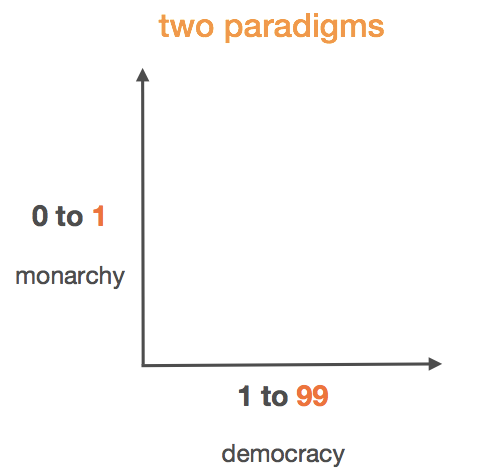
99% vs. 1% is the modern version of the classic sacrificial mechanism. This is all minus one to one. And he should just be alone. 99.99 people or percent is too fractional. Sacrificing 0.1% doesn't really work. You need a whole character to play the victim. Similarly, a ratio of 98: 2 also does not quite match the desired result.

C. We delay the moment, we avoid court
A normal development arc of a company consists of an initial monarchical foundation period, and then a normal period when the founders are gone, and ordinary people come and do business. In the United States were the founding fathers. And then there were all the rest. Perhaps some figures such as Lincoln or Roosevelt were exceptions. But these two stages, as a rule, are clear and distinct.
If you want to be a founder and remain a founder, can you extend the foundation period? In technology companies, the founding process lasts while technological innovations continue. The question, therefore, is how long it will take for the main technological focus to create the process. After you shift towards stabilization and normalization of process work, much less will be done. Thus, each founder will do so in order to never cease to be amazed at new strategies for extending the foundation period in one form or another.
Perhaps this requires a healthy share of paranoia. You can present each board meeting as a court. At best, the board of directors is a jury (although probably not one like you). At worst, this is the crowd that is going to make you a sacrificial animal. Your job as a founder is to win the court. You must make sure that you are not executed. The meeting room, of course, is not the only place where things can go wrong. But this is a typical place where internal affairs go wrong, and the majority of fatal wounds arise from internal rather than external conflicts.
Even something seemingly innocuous, for example, owning the title of general director can actually be very dangerous. Maybe you can find ways to minimize it. Augustus never said that he was a king. It was dangerous to be king after Brut killed Caesar. Therefore, Augustus was only "first among equals". Whether this equality was anything more than pure fiction is, of course, very doubtful.
In October 2000, PayPal’s business was pretty crazy. The fall rate was $ 10 million per month. There were about 4.5 months to take off. When I returned as CEO, this was not a surprise. I was chairman and returned as interim CEO. We went through 6-7 months of searching for a permanent CEO. One decent candidate we found failed. Things were going well, so the council agreed to let me be the CEO. But the company was going to be public, so the Board insisted that we also have a COO. COO is, of course, the codename for candidate No. 1 to replace the CEO - as the vice president for American politics, only more hostile. I was able to convince the Council to make COO David Sachs, which was probably a good and safe move, as David was perceived as more crazy than me. If you think carefully, it was a good insurance in case of dismissal or execution by court at the board meeting.
It is worth mentioning the two founders. The co-founders seem to have fewer problems than unbalanced single founders. Think of Hewlett and Packard, Moore and Neuss, Page and Brin. There are a lot of theoretical benefits from several co-founders, for example, more brainstorming strength, collaboration, and so on. However, the really decisive difference between one founder and several is that in the case of several founders it is much more difficult to identify a scapegoat. Is this Larry Page? Or is it Sergey Brin? Boards of directors who behave like a crowd are very difficult to unite against several people. Remember, the scapegoat must be a loner. The more lonely and isolated the founder, the more dangerous the scapegoat phenomenon. For a skeptic who is prone to discover a fiction that hides the truth, a number of interesting questions arise. Paige and Bryn, for example, are really as equal as advertised? Or was it a security strategy? We will leave these questions unanswered, and are unlikely to ask them.

D. Return of the King
The return of the founder should not be underestimated. Apple is a classic example. There were crazy 12 years from 1985 to 1997. There were very ordinary executives. They could not figure out how to build something new. Obviously, the return of the founder gave the company a very powerful impetus, and during 1997-2011 Apple completely changed the course and built an incredibly powerful arc of development.
The backdating options scandal was relegated to a minor footnote in Apple mythology. Apple shares continued to go up, and the council held back-grant grants, giving Steve Jobs a fairly large windfall.
The scandal of 2001 on the issue of backdating options.
Apple Out of Court Settlement: $ 14 Million
There was no prosecution.
“I wanted respect, not backdating options”- Steve Jobs
Probably not just the creation of great products or the fact that he was good at his own saved Steve Jobs. The fact that he was incurably ill may have been a very important variable. Much less energy will be received after sacrificing one whose energy (and in fact, whose life) is already declining.
I met Steve Jobs once, at the wedding of Mark Andreessen in 2006. Then he was already very painful. At 9 o'clock in the evening he got up from the table and announced that he needed to return to the office to work. It was impossible not to ask the question: Is it real? Did Jobs really work that hard? Or was it an excuse? Maybe he was just bored talking to me.
Resurrection is possible. But you can only be resurrected after death. Founders should think about how to preserve the original moment of the foundation for as long as possible. The key is to encourage perpetual innovation. It is very important to avoid or at least delay the transition to a terrible bureaucracy, where no one can do anything, and everyone is limited.
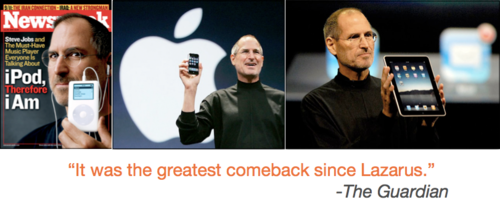
It was the greatest return since the time of Lazarus.- The Guardian
It is usually said that society should be organized in such a way as to satisfy and reward people who follow the rules. For them, everything should be as simple as possible. But maybe we should focus more on people who do not play by the rules. Perhaps they are in some sense the most important. Maybe we should let them get off the hook.
Many readers will feel the influence of Rene Girard on this lecture. To learn more about Girard’s reflections and imitative theory, visit www.imitatio.org .
Note :
I ask translation errors and spelling in lichku. Translated ardin , astropilot editor, all thanks to them.
Source: https://habr.com/ru/post/188952/
All Articles